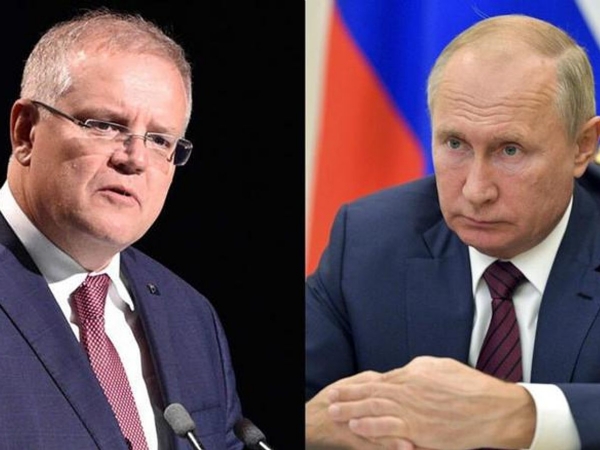Australia announces fresh Russia sanctions, imposes travel ban on Putin
28 Feb 2022 16:33:49
Melbourne, February 28: Australian Prime Minister Scott Morrison on Monday, announced fresh sanctions on Russian President Vladimir Putin and members of the Russian Security Council.

Morrison said, "Australia will continue to work with allies and like-minded countries to impose further economic sanctions on Russia, building on the raft of travel bans and asset freezes implemented in recent days against Russia's most influential political and military actors."
He reiterated that Australia will work with NATO to provide "lethal" military equipment and other assistance to Kyiv.
According to his statement, Australian Government strongly supports announcements by the European Commission, France, Germany, Italy, the UK, Canada, and USA on further restrictive economic measures against key Russian banks, institutions and individuals.
The Australian PM added, "Together, these measures will impose severe costs on the Russian economy by disconnecting its key banks from the international financial system and disrupting Russian trade and investment flows. They will also paralyse Russia's foreign reserves and prevent Russian officials and elites from accessing key financial systems."

Morrison said in a statement, "We are holding Russian President Vladimir Putin to account for his egregious unjustified war against Ukraine. From midnight last night, Australian targeted financial sanctions and travel bans came into effect on the Russian President and remaining permanent members of Russia's Security Council: Foreign Minister Sergei Lavrov, Defence Minister Sergey Shoigu, Prime Minister Mikhail Mishustin, and Internal Affairs Minister Vladimir Kolokoltsev."
He added that Australia supports the most recent anti-Russia measures, including disconnecting certain Russian banks from Society for Worldwide Interbank Financial Telecommunication (SWIFT).
Morrison said, "Australia will continue to work with allies and like-minded countries to impose further economic sanctions on Russia, building on the raft of travel bans and asset freezes implemented in recent days against Russia's most influential political and military actors."
He reiterated that Australia will work with NATO to provide "lethal" military equipment and other assistance to Kyiv.
Also Read | Russia-Ukraine peace talks begin in Belarus
Morrison said, "As an immediate measure, Australia will contribute USD 3 million to NATO's Trust Fund for Ukraine to support non-lethal military equipment and medical supplies. Details of Australia's contribution of lethal military equipment are being worked through with our partners and will be announced soon."
According to his statement, Australian Government strongly supports announcements by the European Commission, France, Germany, Italy, the UK, Canada, and USA on further restrictive economic measures against key Russian banks, institutions and individuals.
The Australian PM added, "Together, these measures will impose severe costs on the Russian economy by disconnecting its key banks from the international financial system and disrupting Russian trade and investment flows. They will also paralyse Russia's foreign reserves and prevent Russian officials and elites from accessing key financial systems."